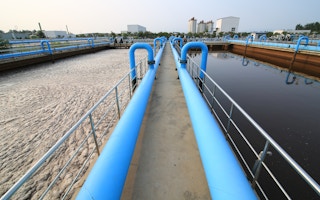PUB, Singapore’s national water agency, and SUEZ environnement, French water and waste management company, on Monday signed an agreement to use Singapore as a test-bed for three new water projects.
To continue reading, subscribe to Eco‑Business.
There's something for everyone. We offer a range of subscription plans.
- Access our stories and receive our Insights Weekly newsletter with the free EB Member plan.
- Unlock unlimited access to our content and archive with EB Circle.
- Publish your content with EB Premium.
The three projects involve wastewater treatment, storm water management and automated meter reading. Using information and communication technologies and analytical software, the two parties will develop a smart water grid.
This will include a decision support tool for storm water management and automated meter reading to track water consumption, which could potentially lead to consumers taking proactive steps to conserve water.
They will also partner on a pilot project to develop an energy-efficient wastewater treatment process by integrating smart monitoring and advanced control strategies.
“
Smart water technologies will provide Singapore authorities and residents new services to be actively involved in resources management and meet Singapore’s determination to become a sustainable city
Paul-Joel Derian, senior vice president in charge of innovation at Suez environnement
PUB’s chief technology officer Harry Seah said that the water agency is always looking for innovative water solutions and such research and development collaborations is the best way to leverage on each other’s expertise.
“This collaboration will also strengthen the Singapore-France water industry relations, add vibrancy to the local water R&D landscape, and boost Singapore’s status as a global hydro hub,” he added.
SUEZ environnement, a spinoff of utility giant Suez, supplies drinking water, delivers wastewater treatment services, collects waste, and produces energy on all five continents. It has 80,990 employees around the world.
The first project between Suez environnement and PUB is a 1.5-year initiative that aims to develop an efficient and stable wastewater treatment process that is energy-neutral.
The idea is for the total energy expended to treat wastewater to be zero eventually, or even energy-producing from the anaerobic digestion of the produced bio solids – a by-product of wastewater treatment.
The collaboration looks to optimise operations to improve and stabilise the activated sludge process (A-Stage); thereby achieving maximum carbon capture and biogas production.
It also wants to develop an efficient B-Stage for efficient ammonia removal. This project will be tested at Kranji Water Reclamation Plant, at a pilot site with a capacity of 50 cubic metres a day.
The second project, which will last two and a half years, aims to develop a reliable and effective storm water management system with a user-friendly dashboard. This will provide operators with good visualisation of the results from both real-time and differed-time simulations of water levels in the storm water network.
The final project, also lasting two and a half years, involves implementing automatic meter reading infrastructure to collect detailed data on household water consumption, which will then be analysed and provided to customers. Customers’ water consumption and conservation patterns will also be investigated
The projects will be supported by the Tech Pioneer grant – administered by Singapore’s Economic Development Board – which encourages water companies to tap on Singapore as a living laboratory so that new technologies can be tested and commercialized in a real-life environment.
“”We are pleased about this collaboration, which ties in with our innovation strategy to support cities in preserving their resources,” said Paul-Joel Derian, senior vice president in charge of innovation at Suez environnement.
“Smart water technologies will provide Singapore authorities and residents new services to be actively involved in resources management and meet Singapore’s determination to become a sustainable city,” he added.










